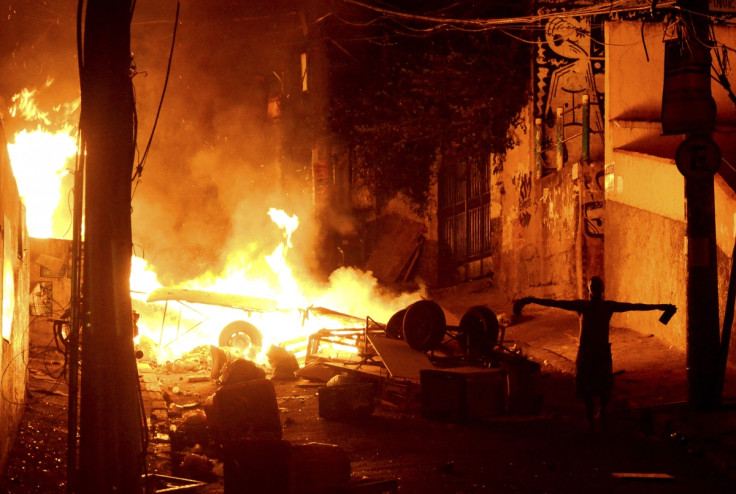Escalating Violence in Rio Slums as World Cup Approaches

Violence continues to rage in the shanty towns of Rio de Janeiro, as the army struggles to maintain control ahead of the World Cup this summer.
Since the army moved in to the favela of Mare, near Rio's international airport, attacks on units have averaged two a day, and two people have been killed, including a 67-year-old woman, killed by a stray bullet on 15 April.
"There are two drug gangs and one militia. So it won't be in two days, it won't be in a year, that we bring peace quickly," said Luiz Pezão, the new governor of Rio, after meeting with Brazil's President Dilma Rousseff.
Three weeks ago nearly 2,500 police and marines moved into the slum to reinforce local police, ahead of the tournament, which runs from June 13 to July 14.
Locals say the favela is dominated by two gangs, the Terceiro Comando Puro, and the Comando Vermelho. Authorities claim the gangs are organising attacks on units stationed in other favelas.
Since the turn of the year, 16 police officers have been killed.
Conflict has also erupted in the Pavao Pavaozinho favela near Copacabana this week, on the doorstep of Rio's tourist district. Locals accused police of killing a popular dancer and actor, Douglas Rafael da Silva Pereira, on 22 April. Hotels were forced to lock their doors after violence spilled out into nearby streets, and police closed a road, tunnel and nearby metro station.
Gunfire rang out, and the local police station was attacked by gangs.
Locals remain sceptical of the so-called 'pacification programme', launched by authorities two years ago to cut crime rates in the slums by installing police units inside communities.
"The truth is there is no pacification. The police enter inside the favela and there's still drug trafficking, nothing changes. It's all for the tourists and the gringos, and it's just because of the World Cup. It's not going to change anything," a community leader, who preferred not to be identified, told the Sunday Telegraph.
Many accuse police of using violence indiscriminately and killing the innocent.
"This effort to pacify the favelas is a failure; the police violence is only replacing what the drug gangs carried out before," Pavao Pavaozinho resident Johanas Mesquita told the Associated Press news agency.
Some critics claim that pacification programmes in the heart of the city have driven criminals to its suburbs, leading to a spike in crime rates.
The programme was initially a success, with the homicide rate as high as 37.8 per 100,000 in 2007, reduced by half to 18.9 per 100,000 in 2012.
Gangs have also launched attacks in some of the biggest favelas, including the Complexo do Alemão and Complexo da Penha in the north of the city.
There has also been an increase in street robberies, from 4,700 last year, to 6,700 this year. Brazils's murder rate of 50,000 a year, according to the UN, continues to make it a more dangerous place than Rwanda, Sierra Leone and Nicaragua.
With 600,000 fans from around the world expected to flock to Brazil's host cities, the authorities declare themselves confident that of their ability to maintain security.
"I can assure you that Brazil has conducted a very well-planned operation to secure the 12 cities," he said.
"Rio de Janeiro will be prepared for the World Cup," Gen. Roberto Escoto told CNN.
© Copyright IBTimes 2024. All rights reserved.







